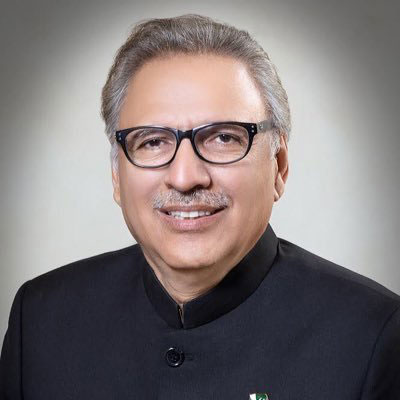Staff Reporter
President University of Management and Technology (UMT) Ibrahim Hassan Murad called on President of Pakistan Dr. Arif Alvi at the President House.
President of Pakistan Dr. Arif Alvi, graciously hosted President UMT Ibrahim Hasan Murad and discussed various points of mutual interest mainly surrounding higher-education & artificial intelligence.
President Alvi appreciated the role of UMT in the field of education and paid homage to the educational services of former UMT Chairman Dr. Hasan Sohaib Murad (Shaheed). President Dr. Arif Alvi said that technological advancement has changed the education scenario, so we need to stay updated with the changing times.
He also expressed that our young leaders in the field of higher education can promote National development in all walks of life.
President UMT Ibrahim Hassan Murad expressed his gratitude to Mr. President for sparing precious time. Ibrahim Hasan Murad discussed strategies & best practices regarding Higher and inclusive Education with Dr. Alvi.
Mr. Murad said that youth is the future of our country therefore efforts to drive youth and national character building campaigns must be highlighted.
UMT is one of the best universities in Asia where students from different cities across Pakistan, especially from every district of Balochistan, are getting quality education on scholarships; he added.
Ibrahim Hasan Murad said that we must realize the benefits of technology in our education system therefore policy makers and academia must go hand in hand in deploying emerging solutions to the decades old problem in society.
Such a collaborative network can transform the dream of becoming a developed country into reality; he said.
‘Empowering Women for better water management’: Experts call for harnessing society’s untapped potential
A high-profile panel of experts has drawn the attention of the policymakers towards boosting women’s inclusion in the water sector leadership through legislative reforms and a social revolution.
They shared their opinion at a webinar ‘Women’s leadership in water sector’, jointly organized by International Water Management Institute (IWMI) and Hisaar Foundation here on Thursday.
Moderating the session, IWMI’s Country Director Dr Mohsin Hafeez talked on the patriarchal nature of Pakistan wherein men are chosen as breadwinners while women are delegated responsibilities as child-rearers.
Bolstering his viewpoint through statistics, the expert said women constitute almost 50% of the population and their employment to Population ratio is 20.1% as compared to men which is 77.0 %. For example, the total labour force engaged in agriculture was 43.7 %. Among these agriculture labour force, 75.5% are women.
Taking a strong exception to the women’s exclusion from the water sector, Dr. Hafeez shared that the committee that recently passed the Sindh Water Act had no women representation.
In her keynote address, Hisaar Foundation’s Chairperson and IWMI’s board member Simi Kamal highlighted the fact that women need to toil hard with passion to secure leadership roles in the water sector.
The expert cited sisterhood and integrated networks among women as a strategy to sweep to leadership roles in the sector.
Simi, who heads Hisaar Foundation, elaborated that women value water because they are well cognizant of its efficiency and environmental sustainability through the prism of sanitation and domestic usage.
Sharing her experiences stretched over four decades, the expert observed that women were intertwined in multiple aspects of water governance but their representation in discussion forums is minimal.
“The sustainable development goals (SDG) can create synergy and put women on the centre stage in water management,” Simi remarked.
She expressed that women were already well aware of hygiene practices such as hand washing and their response during the Covid-19 pandemic as global leaders have raised the bar high.
Simi shared examples from across the globe highlighting how women have been playing a crucial role in water administration in regions as far as Africa and Europe; she, however, confessed that women in Pakistan were assigned menial tasks when it comes to water management.
“Women are afraid of field related tasks for fears of security,” Simi said and proposed a quota system as a solution to the panacea.
Chipping in, human rights activist Sameena Nazir highlighted that women’s activities are centred around water but they are denied knowledge about the same.
Taking a strong exception to the importance of water, the expert shared that religious tensions have erupted out of water disputes in the country.
Sameena, who heads the PODA foundation, shed light on the importance of advocacy for enhanced inclusion of women in the water sector.
Taking part in the discussion, Sophia Hasnain regretted that women were treated as the ‘other’ in the water discourse because of male domination in the sector.
“Women have been contributing heavily to the water debate but the recognition is minuscule,” said Sophia and emphasised the need for social inclusion besides mentoring men for creating an enabling environment.
To get technological insight, Dr Arjumand Zaidi was brought into the discussion who admitted that the challenges for women in the water sector were intense.
Dr Arjumand, an expert on environmental evaluation, called on the aspiring water experts to create an impact through their professional acumen.
The environmentalist stressed the need for patting women on the back over their achievements.
One of the panellists, Sarwat Sughra emphasised the need for shaping up the narrative to make the environment more conducive for women to showcase their expertise.
Sughra underlined the need for active participation of the populace for water awareness apart from finding sustainable alternatives and inculcating behavioural change.
The participants agreed on incorporating women in the policy debates about water for its effective and efficient utilisation in the country already striving hard to meet its needs.










